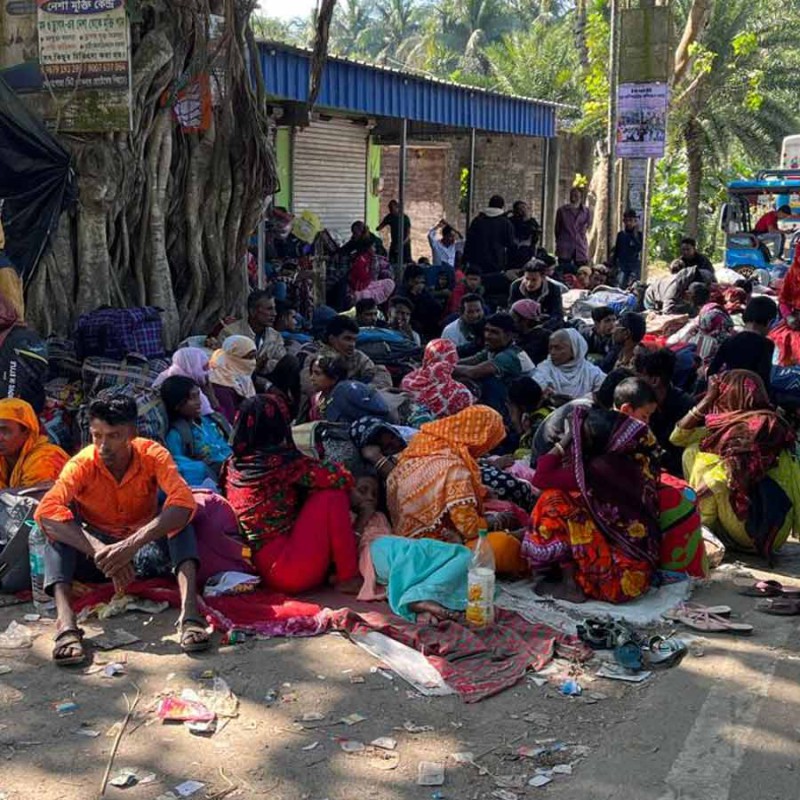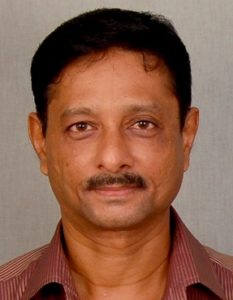Articles
A reality check on SIR-driven Reverse-migration and the Internal disquiet
Opinion | Articles | Isaac Harold Gomes | 27-Nov-2025

Homeward Bangladeshis at the Indo-Bangladesh border

Since my last report of 10th November on the Special Intensive Revision (SIR), an unprecedented reverse migration into Bangladesh has begun through Hakimpur, North 24 Parganas, West Bengal, India-Bangladesh check-post.
On 23.11.2025 Anandabazar.com reported:
- Hakimpur started witnessing this sudden reverse migration only after the crackdowns on illegal Bangladeshi immigrants in several states including Delhi. This operation was stepped up last week and resulted in hordes of people queuing up at Hakimpur check-post. All declared to the BSF, "We are infiltrators, we came illegally, we want to return to Bangladesh." On the other side of Hakimpur is the Kalaroa subdivison of Satkhira district, Khulna Division Bangladesh.
- One BSF officer said, on condition of anonymity, that 200 people, out of those waiting in temporary tents in front of the check-post, were called in groups every day. Their self-admitted addresses in Bangladesh were recorded, their photos taken and their interrogation session video recorded. After that, they were escorted to the Border Guard Bangladesh (BGB) which would take them back into Bangladesh after verifying their names and addresses which they declared to the BSF. So far, the BGB has accepted all Bangladeshi infiltrators handed over by the BSF.
- When Anandabazar reporter Ishandeb Chattopadhyay questioned where they lived after slipping into West Bengal, they answered they found shelters in the slums of Bidhannagar, New Town, Rajarhat, VIP Road, Dum Dum, Birati; in huts built on government land; and the neighbourhood behind City Centre-2. On the reporter’s enquiry about their Bangladesh homes, they mentioned their Bangladesh addresses without any hesitation. They also confirmed they have been staying in West Bengal for three-ten years (declarations telecast live on ABP Ananda TV).
- In the suburbs of Kolkata, they mostly made a living by working as unskilled labourer, domestic help, pulling vans, carrying goods for builders/promoters and cleaning the bathrooms/toilets of flats.
- On being asked whether they procured any Indian identity cards after coming to India, Ishandev Chattopadhyay reported in Anandabazar.com of 21.11.2025 that one infiltrator named Ruknuzzaman Rony, aged 24 years admitted as follows:
- His original home is in Nawabenki village of Satkhira district, Bangladesh.
- He left Bangladesh for India when he was 20, for a better quality of life. His whole family crossed a large river near the Sundarbans at night, paying around Rupees five thousand per head. They were put on the Hasnabad-Sealdah local train. The middleman warned them they should deboard at Bidhannagar Road station to avoid arrest.
- Rony said for organised infiltrators Bangladesh, getting Indian identity documents wasn’t very difficult. For their Aadhaar cards, first a person who matched Rony’s father's name was identified on the government website. His Aadhaar card was printed and submitted as Rony’s father's Aadhaar card. But that person’s and Rony’s father’s address didn’t match. So, the local panchayat helped procure a 'residential certificate' in Rony’s father's name. Rony also got his birth certificate from the panchayat office. As soon as he submitted these, his Aadhaar card was issued. The Babus generally ask for around Rupees twenty-five thousand per head. Rony bargained at Rs 20,000 per head for his family. After getting the Aadhaar card, there was no problem in getting a PAN card. However, he claimed he didn’t get his family members’ voter cards done. He said he knew many people from Bangladesh had done this.
- In Newtown locality Rony worked in garments-making sector and earned Rs 10,000 per month. In Bangladesh, this job would fetch a little over 6,500 Bangladeshi taka per month (around Indian Rs 5,000). He said it’s difficult to find work in Bangladesh except in brick kilns where works conditions were very harsh.
- There are other extra benefits in West Bengal/India namely, rations, bank transfers to women and the elderly every month, and free treatment in hospitals. These benefits aren’t available in Bangladesh, and no wonder incentivize infiltration.
- He said many infiltrators like him were now fleeing back to Bangladesh as ‘SIR’ has begun in West Bengal. They’re all waiting for the BSF to open the gate of Hakimpur check-post and hand them over to the BGB to be let into Bangladesh.
- No BSF personnel was willing to talk officially to reporters. They were asked to contact the DIG of the South Bengal Frontier headquarters, Newtown.
- If a reporter asked who are being allowed to return to Bangladesh and who are being asked to stay back in India (CAA lines?), the conversation was abruptly closed.
- On the mention of 'SIR', the BSF senior sub-inspector on duty replied, "We carry out whatever orders we receive from the Union Home Ministry through higher-ups. We just follow their orders and the procedure to deport infiltrators back to Bangladesh."
- This phenomenon of reverse migration has been swelling up daily since ‘SIR’ (voters’ sanitization drive) took effect in West Bengal.
SOME OBSERVATIONS:
- The above reverse migration from Hakimpur check-post makes it evident that illegal migration into West Bengal from Bangladesh is a demography-changing reality, especially in the border districts of Bengal.
- This has led the infiltrators from other countries eat into our national exchequer (welfare schemes, employment/livelihood - as above Anandabazar exposé reveals, real estate ownership, civic amenities). If not addressed jointly by the central and state forces, it will hugely compromise policy decisions, government change and national security. In Bihar SIR the ratio of ‘suspected foreigners’ was 12 per 1,000 voters. 7 were Nepalese and 5 were Bangladeshis. The Final Bihar voters’ list (after deletion of 68.66 lakh and addition of 21.53 lakh voters was 7.42 crore. (Source: Jawhar Sircar IAS -former CEO of West Bengal and former Rajya Sabha Member on his deliberations on ABP Ananda TV on 25 November 2025).
- The million-dollar question on SIR is: why is the ECI in such a tearing hurry making BLOs of (86,000+ booths in West Bengal) upload on their smartphones the filled-up enumeration forms (on the ECI App) burning midnight oil? Many BLOs don’t have smartphones. They are taking assistance from their family members/friends to upload the voters’ data. This has compromised the sanctity of voters’ data.
- Citizens view the ECI with suspicion as its selection is not neutral. Earlier in the Anoop Baranwal Case, 2023, the Supreme Court (SC) ruled that a panel comprising the Prime Minister, Leader of the Opposition (LoP) and Chief Justice of India (CJI) would select Election Commissioners (EC) including Chief Election Commissioner (CEC), until Parliament passed The CEC and Other Election Commissioners Bill, 2023 which empowers the Prime Minister (chairperson), LoP and a Union Cabinet Minister (arbitrarily dispensing with CJI). Thus, the panel to select the ECs is heavily loaded in favour of the government. So, it’s next to impossible for the ECI not to toe the union government’s line. Ceaser’s wife imust be above suspicion.
- With today’s data capture system, the ECI could easily have pre-filled the 2002/2003 voters’ data on the bottom lefthand box of the Enumeration Forms (as it has done on top of the form for voters’ data for 2025). This would have avoided a lot of confusion and save time for all including BLOs/data enumerators.
- Regarding SIR related petitions, the Supreme Court has restrained high courts from dealing with these as it is seized of the matter.
- The bench has also sought the ECI’s response to the additional affidavit filed by the Association for Democratic Reforms (ADR) that, among other things, had challenged the poll panel’s jurisdiction to verify the citizenship of voters.
- Highlighting the deaths due to ongoing Special Intensive Revision (SIR) of electoral rolls in West Bengal, Chief Minister Mamata Banerjee on Thursday (November 20, 2025) wrote a letter to the Chief Election Commissioner (CEC) Gyanesh Kumar urging him to halt the ongoing exercise (The Hindu 20.11.2025). She warned that continuing with the “unplanned, coercive drive” would not only endanger more lives but also “jeopardise the legitimacy of the electoral revision itself”. No doubt it’s a ploy to stop SIR in its track (deletion of Dead/Duplicate/Absentee/Permanently-shifted voters)!
- Meanwhile, CPI(M) State Secretary Md. Salim wrote a letter to Chief Electoral Officer, West Bengal, Manoj Agarwal alleging that “Serious reports indicate forms are being systematically diverted to the incumbent ruling party, with BLOs being coerced or outright compelled to submit fraudulent declarations to the Election Commission, claiming a flawed 100% distribution rate. This declaration defies statistical reality,” the CPI(M) leader said. He meant to say that dead, duplicate and fake voters constitute a huge chunk of the ruling dispensation. Having been in power for more than three decades he knows the tricks of the trade very well!
- The current NDA government has a penchant for giving ‘shock therapies’ to the Aam Aadmi. It began with ‘Notebandhi’ in November 2016, then Covid-19 ‘Lockdown’ from 25th March 2020 to 31 May 2020 and then again in April 2021 in UP, and now we have ‘SIR!’ Going by the past precedents, it appears ‘SIR’ is just a precursor for more future shocks.
- To the claim by the petitioners that the SIR was inherently exclusionary, the SC Bench comprising Chief Justice of India Surya Kant and Justice Joymalya Bagchi observed on Wednesday 26 November that despite the widespread apprehension voiced earlier about mass exclusions in Bihar, not a single voter had come forward to challenge a deletion. "We experienced a strange thing in Bihar. We kept on directing, sent our paralegal volunteers...nobody came forward to say I have been excluded,” the CJI observed. This suggested that the deletions from the Bihar roll on grounds of death, migration and duplication were correctly done. (Source: Live Law 26.11.2025 Link: https://www.livelaw.in/top-stories/no-voter-came-forward-to-challenge-exclusion-despite-apprehensions-of-mass-deletions-after-bihar-sir-supreme-court-311302
- How about the Government of India considering making the ‘sanitized’ chip-embedded EPIC an all-purpose Identity Card by phasing out Aadhaar and PAN?
(The contributor is a member of the Indian Catholic Press Association, a social activist, and a freelance journalist. He writes for different publications on various issues. He can be reached @ isaac25gomes@gmail.com. Views expressed are personal)
Visitor comments
Leave a comment

A. F. Gonsalves
28-Nov-2025
Very good article by Mr Isaac.However I fail to understand why an entire population must go through this ordeal of SIR just for the sake of a few thousand poor Bangladeshis who have crossed over in search of greener pastures